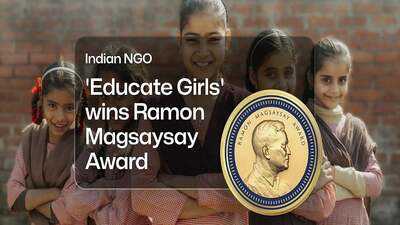London | Mumbai-headquartered Educate Girls was recently named the first-ever Indian non-profit organisation (NGO) as the winner of the 2025 Ramon Magsaysay Award, an honour that its founder believes is an acknowledgement that girls' education is not a regional issue but a global priority.
Safeena Husain, who founded the NGO in 2007 to empower girls to break cycles of poverty and illiteracy, was recently in London and reflected upon how Asia's premier honour demonstrates that people-powered approaches can solve last-mile problems when communities, civil society and governments work together.
“To be the first Indian organisation to receive the Magsaysay Award is a historic achievement," Husain told PTI.
“For us, this award belongs to the thousands of girls who refused to give up on their dreams, to every family that chose to keep a daughter in school, every volunteer who knocked on a door, every state government that partnered with us, every donor who believed in us. It tells the world that girls' education is not a local issue, it is a global priority," she said.
The 67th Ramon Magsaysay Awards presentation will take place in the Philippines capital of Manila on November 7, when Educate Girls will receive a commendation for its “commitment to addressing cultural stereotyping through the education of girls and young women, liberating them from the bondage of illiteracy and infusing them with skills, courage, and agency to achieve their full human potential”.
The NGO will join high-profile past winners including filmmaker Satyajit Ray and Nobel laureates the Dalai Lama and Mother Teresa.
“In 10 years, we want to see a world where every girl completes secondary school, where education is the norm and not the exception, and where gender inequality is something we only look back on as history," shares Husain.
She notes that there are still about 122 million girls out of school globally. Through the NGO's Pragati initiative, girls are seen not only re-entering education but excelling.
“Our vision is for every Pragati girl to have that same opportunity to thrive. If our community-led, locally owned model becomes a blueprint for governments and NGOs worldwide, we will begin to close the gap," notes Husain.
It was back in 2005 when Safeena Husain was confronted with the stark reality that millions of girls were still denied even basic education. She vividly recalls visiting a village in Rajasthan where a 10-year-old girl spent her days grazing goats because her family believed school was unnecessary for her.
“Sitting with families like hers, I came to understand both the barriers and the untapped potential of these girls. That moment shaped my conviction that education transforms not just a girl's life but her entire family and community, which is what inspired me to dedicate myself to this mission," says Husain.
Putting the community at the heart of the solution has been the NGO's success story, including through “Team Balika” (Team for the Girl Child) — a volunteer network of educated youth from the same villages who go door to door to identify out-of-school girls and build trust with their families.
“Once girls are back in school, our remedial curriculum, Gyan ka Pitara (Repository of Knowledge), helps them build foundational literacy and numeracy skills, so they not only attend but also learn," she said.
For girls who have already dropped out and missed years of education and are no longer eligible to return to formal schooling, they launched the Pragati program to additionally equip girls with essential life skills and digital and financial literacy.
Over time, operating in over 30,000 villages with more than 55,000 volunteers, this approach has brought more than 2 million girls into education, improved learning for 2.4 million children, and achieved a retention rate of 90 per cent.
“The next decade is about a bold and ambitious goal: 10x10, aiming to reach 10 million learners in 10 years. To achieve this, we must go where exclusion is deepest — into the most marginalised and remote geographies, and build flexible and inclusive pathways for adolescent girls and young women who have no structured way to return to education today.
"Technology and data will help us find out-of-school girls with precision, but the driving force will always be the community, families, volunteers and local leaders changing mindsets door by door," adds Husain.
The Magsaysay Award is an annual honour that recognises individuals and organisations for their selfless service and transformative leadership in Asia.
You may also like

Chef reveals 20-minute method that's 'one of the tastiest ways to cook salmon'

Wooden cutting boards will stop harbouring bacteria with 1 natural cleaning method

Brits told to sprinkle cayenne pepper in their home in November

Tom Aspinall's huge net worth, very private wife and retirement plans ahead of UFC 321

Indian Ambassador to US extends Diwali greetings to citizens, diaspora (IANS Exclusive)







